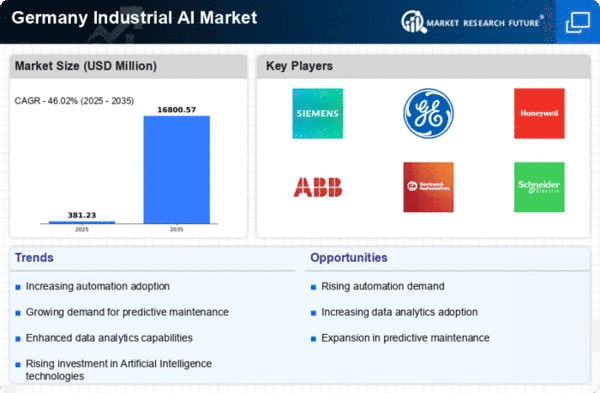Rising Demand for Efficiency
The industrial ai market in Germany is experiencing a notable surge in demand for efficiency across various sectors. Companies are increasingly seeking to optimize their operations, reduce waste, and enhance productivity. This trend is driven by the need to remain competitive in a rapidly evolving market landscape. According to recent data, organizations that have integrated AI solutions report efficiency improvements of up to 30%. This drive for efficiency is particularly evident in manufacturing, where AI technologies are employed to streamline processes and minimize downtime. As a result, the industrial ai market is likely to expand as businesses invest in advanced technologies to achieve operational excellence.
Talent Shortage in AI Expertise
The industrial ai market in Germany faces a challenge due to a talent shortage in AI expertise. As companies strive to implement advanced AI solutions, the demand for skilled professionals in data science, machine learning, and AI development is outpacing supply. This gap in talent may hinder the growth of the industrial ai market, as organizations struggle to find qualified personnel to drive AI initiatives. To address this issue, companies are increasingly investing in training programs and partnerships with educational institutions. This focus on talent development is crucial for sustaining the momentum of the industrial ai market in Germany.
Government Initiatives and Support
The German government is actively promoting the adoption of AI technologies within the industrial sector, which significantly impacts the industrial ai market. Initiatives such as funding programs and strategic partnerships aim to foster innovation and research in AI applications. For instance, the government has allocated over €1 billion to support AI research and development, which is expected to bolster the industrial ai market. This support not only encourages companies to adopt AI solutions but also enhances collaboration between academia and industry. As a result, the industrial ai market is poised for growth, driven by favorable policies and financial backing.
Focus on Data-Driven Decision Making
In the industrial ai market, there is a growing emphasis on data-driven decision making among German companies. Organizations are recognizing the value of harnessing data analytics to inform strategic choices and improve operational outcomes. By utilizing AI tools to analyze vast amounts of data, businesses can identify trends, forecast demand, and enhance supply chain management. This shift towards data-centric approaches is expected to propel the industrial ai market forward, as companies invest in AI solutions that facilitate informed decision making and drive competitive advantage.
Integration of IoT and AI Technologies
The convergence of Internet of Things (IoT) and AI technologies is reshaping the industrial ai market in Germany. The integration of IoT devices with AI algorithms enables real-time data analysis and decision-making, enhancing operational efficiency. This synergy allows companies to monitor equipment performance, predict maintenance needs, and optimize resource allocation. Recent studies indicate that businesses leveraging IoT and AI can achieve cost savings of up to 25%. As industries increasingly adopt these technologies, the industrial ai market is likely to witness substantial growth, driven by the demand for smarter, interconnected systems.
















